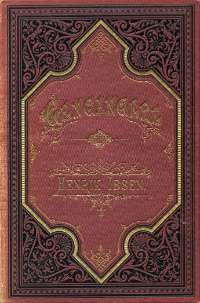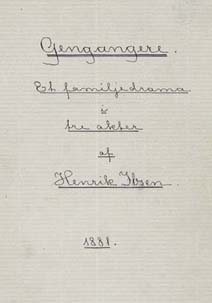

Brief description
A number of scattered notes on Ibsens work on Ghosts have been preserved. These are undated, but probably date from the winter and spring of 1881. Ibsen was living in Rome when the first connected draft of the play was started at the beginning of June 1881. On 18 June he wrote to his Danish publisher Frederik Hegel:
One of the first days of this month I started to get down to the subject of a play that has occupied my thoughts for a long time, and now forced itself upon me to such an extent that I could no longer leave it alone. I hope to be able to send you the manuscript by the middle of October. I will let you know the title later; all I can do today is to call it 'a family drama in three acts'.
[read the letter in HISe]
The first draft has not been preserved, but was finished on 23 September according to a letter Ibsen sent to Hegel at the end of September. Ibsen was in Sorrento at this point. Two days later he began the fair copy. This is extant, and as can be seen from the manuscript [see the manuscript in original handwriting] it contains so many corrections that Ibsen very likely wrote a second fair copy. The fair copy of the first act was sent to Hegel on 16 October. The second act and the first page of the third act were posted on 4 November, while the last act must have been posted a week or two later.
On 23 November Ibsen, suspecting what was to come, wrote to Hegel: «It is reasonable to suppose that 'Ghosts' will cause alarm in some circles; but so it must be. If it did not do so, it would not have been necessary to write it.» [read the letter in HISe]
Ghosts was published by Gyldendalske Boghandels Forlag in Copenhagen on 13 December 1881 in an edition of 10 000 copies. The book caused such a storm of horror and anger as Ibsen had never experienced before. There were loud cries of nihilism, an attack on the values of the church, a defence of free love, a violation of such taboos as incest and syphilis. The outcry affected sales of the book and large quantities of unsold copies were returned to the publisher. The owners of bookshops were ashamed to have the book on their shelves, and it was not until 1894 that a fresh edition was needed.
Ghosts was sent to a number of theatres in Scandinavia, but they all turned down the play, including Det Kongelige (Royal) Teater in Copenhagen, Nye Teatern and Dramaten in Stockholm, and Christiania Theater. Thus the very first performance of Ghosts took place at the Aurora Turner Hall in Chicago on 20 May 1882. The play was done in Norwegian for an audience of Scandinavian immigrants. Mrs. Alving was played by the Danish actress Helga von Bluhme, and the other parts by Danish and Norwegian amateurs.
The first European production of the play was in Helsingborg on 22 August 1883, by the Swedish August Lindbergs theatre company. Lindberg directed and also played the part of Osvald himself. After the first night in Helsingborg the production was shown in Copenhagen, Stockholm and for the first time on Norwegian soil at Møllergadens Theater in Christiania on 17 October 1883. The production received very good reviews and was performed no fewer than 75 times during the autumn of 1883.
(From ibsen.net)
Plot summary
Mrs. Helene Alving is the widow of Captain Alving, late Court Chamberlain, of Rosenvold – a man of high esteem in the community. The marriage was an unhappy one for Mrs. Alving, but she did everything in her power to conceal the fact that her husband was an alcoholic who lived a depraved life at the manor. Alving had a daughter, Regine, by a servant at the house, and a son, Osvald, by his wife. Regine is now Mrs. Alving's servant, while Osvald was sent abroad as a child to protect him from his home surroundings. Regine thinks she is the daughter of Engstrand, a carpenter who is now finishing work on a children's home to be opened the next day in memory of Captain Alving. After this Engstrand wants to take Regine to the neighbouring town to help him start a public house for sailors. Regine and Mrs. Alving are both opposed to this. Regine imagines being able to go to Paris with Osvald, a painter who has come home from Paris in order to be present at the opening of the children's home.
Manders, a clergyman in charge of the financing of the home, has also come for the opening. When young, Mrs. Alving was in love with Manders and wanted to leave her husband for him, but Manders rejected her and sent her home.
The night before the ceremony the home in memory of Captain Alving burns down. Manders has insisted that the home should not be insured, and now he is afraid for his reputation as a clergyman and financial manager. He comes to a secret agreement with Engstrand, by which the latter takes the blame for the fire and in return funds for running the home are to be invested in Engstrand's projected «sailors' home» in the town.
Osvald tells his mother that he is suffering from syphilis, which he thinks he has contracted as a result of his bohemian life in Paris. He is afraid of becoming a helpless invalid, and hopes that Regine will be willing to help him to take an over-dose of morphine in the last stage of his illness. But when Regine realizes that he is ill, and in fact is her step-brother, she leaves Rosenlund to make her own way in the town. Mrs. Alving tells Osvald of his father's true nature, and that he has inherited the disease from his father. It is now up to her to decide whether she is willing to help her son by giving him the over-dose of morphine. The play ends as the sun rises and Osvald has succumbed to the last stage of his illness.
(Source: Merete Morken Andersen, Ibsenhåndboken, Gyldendal Norsk Forlag, 1995.)
Read Ghosts (in Norwegian)
In the online version of the official Ibsen edition (HISe), you can read Ghosts in various formats. This content is currently only available in Norwegian. Follow the links below to read the play:
Introduction to the work (in Norwegian)
The online version of the official Ibsen edition (HISe) offers extensive information about Ghosts in Norwegian. Follow the links below to read about various aspects connected to the play.
- Background
- Creative process
- About the publication
- Translations in Ibsen's life time
- Stagings in Ibsen's life time
- More information
Reviews
Here you can find reviews in full text and an overview of registered reviews in various languages.
- Reviews from Ibsen's life time in full text
- Reviews registered in the Ibsen bibliography (nb.no)
- Reviews registered in "Norsk litteraturkritikk" (UiO)
Translations
- The Multilingual Ibsen
- Translations in various languages
- Overview of translations from Ibsen's lifetime (HISe)